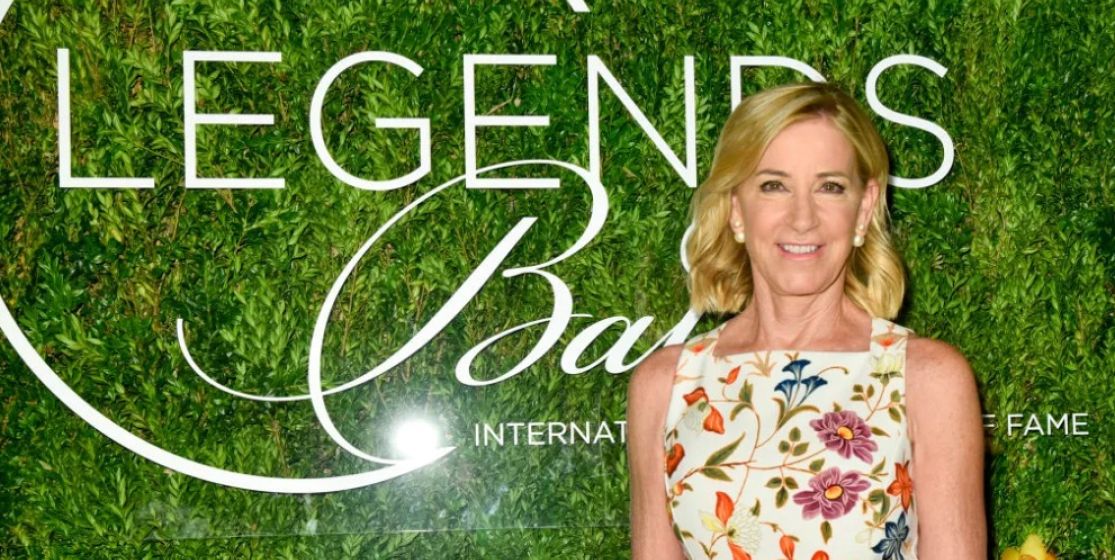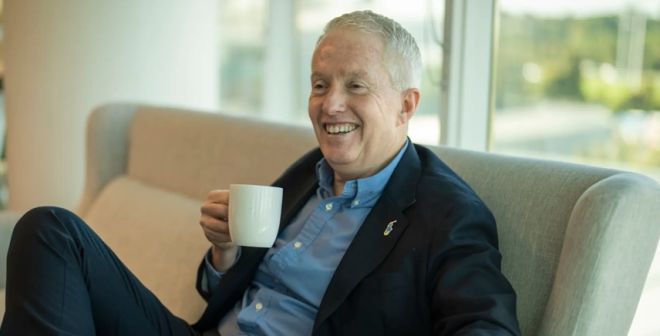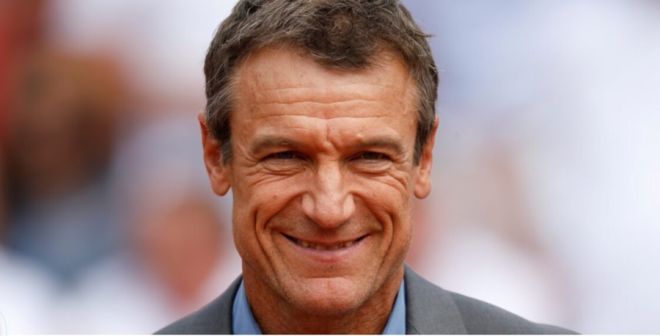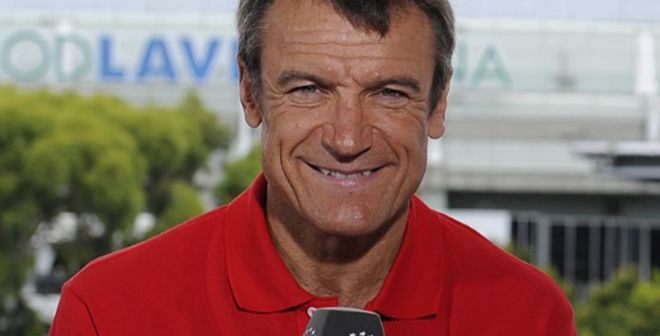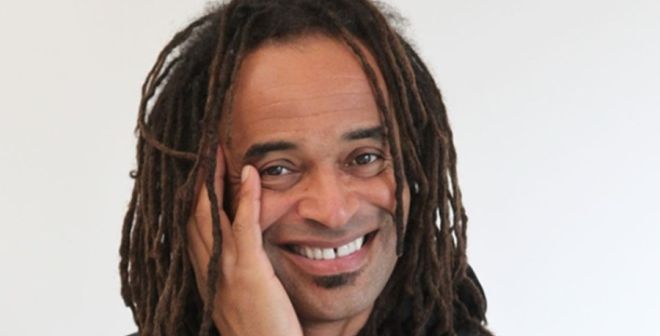Q. Chrissie, thanks for doing this. My first and I think the most important question I can ask you is how are you?
CHRIS EVERT: I'm good! I'm good. You mean my cancer?
Q. Yeah.
CHRIS EVERT: Well, I'm cancer free, so I'm good. I have to get a CAT scan every three months to be proactive with it, because it came back a second time, and they want to be cautious. But I just had my CAT scan, and everything was clear. So that's all I can do. I feel like I'm living every three months, every three months, and then I get a CAT scan. But I'm doing fine and I'm getting stronger and stronger, so that's good.
Q. Good. You recently told me you broke your collarbone. Do you think with all the cancer treatments that you have been through that these sort of things have maybe made you a bit more prone to physical fragility?
CHRIS EVERT: Well, no. That was a freak I'm not going to go into how it happened, because that was a freak accident. It was a freak accident, and no. My bone density is normal and still above average for someone my age. No, I don't think so. I think, because I have been an athlete and taken such good care of myself, it's been easier to, get my strength back and get my fitness back. So, no. The answer to your question is a big fat no.
Q. Well, you just touched on something I was going to ask you. How important was your career as an athlete in helping you get over what you went through physically and I guess also mentally?
CHRIS EVERT: Well, I mean, I think just being a top professional athlete, you have to have thick skin anyway, and you have to have a backbone, and you have to be used to ups and downs and bad losses and good losses. I think that has helped me tremendously in this fight. I think it's definitely the competition and being a professional athlete has helped me.
I also think it's my nature and to be pretty patient about things. I have always taken blows pretty well, emotionally and mentally, so you say this and then, I don't know. If somebody came to me and said I was going to die tomorrow, I don't know how I'd react, but I think I viewed it as something that was a challenge, and I viewed it also as being humble about it and thinking, well, why not me?
I mean, half the world has cancer or half the world will get cancer, or so many women like me when they, especially when they get to my age, whether it's breast cancer or any kind of cancer, it's pretty probable that you're going to get it. So, my reaction was, okay, well, so I'm just like everybody else.

Q. How scared were you when you got the diagnosis the first time and then again even the second time when you consider what happened with Jeanne your sister and what you and the whole family went through during those periods?
CHRIS EVERT: Well, yeah, I was pretty good. I was in a daze a little bit. I wouldn't say shell shocked but almost shell shocked. It was quite alarming when I first got diagnosed, because I went in for surgery, a hysterectomy that was to be proactive. And nobody, the doctors, expected to find any cancer. So, when they came back with, ‘Oh, we found some cancer’, I was taken aback.
Then they said and I think what really made me alarmed was they said, ‘So we have to go back in, because we have to check to make sure that it hadn't spread’. So, I had to go in for a second surgery ten days later. So there for three or four days I was waiting to find out, I think I was waiting to find out if I was clear or I was waiting to find out if it had spread, being Stage 3 or Stage 4, which my sister was, and that didn't turn out very well. I think that was the most frightening time in the whole experience.
Q. How much of your perspective of life changed?
CHRIS EVERT: It changed more. It changed me not worrying and fretting over stupid little things. It made you realize that, okay, your health and your loved ones really are the things that you should be focusing on and are the most important things in life. Not money, not did I get this endorsement, not how many Grand Slam titles I won, not so and so's talking about me, little silly things like that.
I think it made me stronger in the sense of, a stronger sense of myself, and when I spoke, like people were surprised that I was so open about having ovarian cancer. I'm, like, why? I'm not ashamed. It's like women, I want to help women.
This is a reality and this happens to women, and I want them to really know that they can be proactive and they can prevent this if they get testing and if they get genetic testing, especially, because really my whole thing, the BRCA gene, B R C A, BRCA gene, it's genetic, and that's what my sister Jeanne had and I had it, as well, and my whole family has been tested, but you have the BRCA gene, you have a good chance that you will either get breast or ovarian cancer.
Q. I don't want to harp on this much more, but there are a couple of things I want to ask you. The article that you did alongside Martina Navratilova with Sally Jenkins was an amazing, amazing story. I have kept that, and it's a must read for anybody. Was it cathartic to do that piece?
CHRIS EVERT: Oh. Oh, yeah. I mean, look, if I wanted to be in the trenches with anyone, it would be Martina (laughter). We were in the trenches together, and we were growing closer and bonding over the fact that we would look at each other, and say, how is this happening?
We both got cancer at the same time. It was unbelievable timing. We both had it at the same time. We both were going through chemotherapy and radiation, everything, at the same time.
I just think to have somebody that close to me share this experience with, and Sally, who knows us better than any journalist, because she's been around for 50 years, she knows us personally, it was really, I think, enlightening, enlightening and cathartic, like you said. That was a good word. But it was a very positive article on something very, you know, traumatic and bad.

Q. I think with the two of you ladies, the late Australian singer Helen Reddy's anthem, "I Am Woman," is a perfect anthem for the two of you.
CHRIS EVERT: Yeah, yeah. I mean, we have a platform, and we chose to shout out from the mountains about cancer and about, we're a part of a sorority that we don't want to be in really, but we are part of a sorority of cancer victims, and we had something to say about it.
We had some good advice, I felt. An example, I will just give you one example, I have had so many calls from women around the world, and I would say four or five of my good friends went to get tested, and they have cancer.
My massage therapist was having cramps. I said, ‘You've got to get tested, genetic testing.’
And she went and got genetic testing, and she has Stage 3 cervical cancer. It makes me, and I think Martina and I both feel like, we're doing something that is helpful to other people. After being in a selfish sport, when you're an athlete, you're only thinking about yourself, and it's really refreshing to know that you're helping people, as well.
Q. For someone who had such a, and I say this in a polite way, stoic personality on court, you have been through a lot in your life, haven't you?
CHRIS EVERT: Yeah. Yes, I have been through a lot. (Laughter.) Yes, I have been through a lot. I mean, through different phases from, you know, growing up in a very strict Catholic God-fearing environment, and to joining the tour at 18 and really not having much experience in life at all and kind of learning by myself, learning the ropes, learning how to deal with the press, learning how to compete on the court, learning how to deal with the public, learning how to deal with fame and fortune, I pretty much did that all by myself.
Nowadays, there are mentors. Back then there were no mentors. We traveled by ourselves, and we had to rely on just ourselves. Then to be married three times and then to have that emotional upheaval of people, and then get cancer, go through the chemotherapy and do all that.
You know, Craig, when I look at it, I kind of had a privileged life. This is the way I look at it. I had a privileged, very happy, privileged life until I was like 50 years old, and then I laugh, because it's kind of like downhill from there. (Laughter.)
Q. Was it tough being so mentally tough? I have known you for a long time, and you are really an incredibly funny person. I think a lot of people didn't see or realize your actual personality, because they only saw what they saw on a court.
CHRIS EVERT: Yeah. Yeah, right when I was a kid, my dad taught me not to show my emotions. He pretty much spearheaded that. Don't show your emotions, because you don't want your opponent to see how you're feeling. They'll use that to their advantage. I was pretty much it came easy to me, though, because I'm not a real, like, vibrant, emotional person anyway. I'm more introverted than extroverted anyway.
It's not like it was faking a person. That came easy to me. I'm a private person. People that know me know my personality, know that I'm not I can be outgoing, I can be funny. There is a lot of characteristics that the public doesn't see. But I just wanted to protect myself. I didn't want everybody to know everything about me and I didn't feel like that comfortable with people looking at me and staring at me and the attention. I honestly didn't feel that comfortable with it.

Q. So do you think you could have gotten through, in a similar way, these days, where you’ve got a 24 hour news cycle, you've got the craziness of social media, et cetera?
CHRIS EVERT: Well, that's a question that nobody can answer. It's like you're born in a different era, would you be the same person? That's the thing there, right? I don't know. I mean, I really don't know, because I think how much of who you are or who you become has to do with your upbringing, your family, your parents, and your friends.
All of that might have been a little bit different in this day and age. It is so different growing up as a kid now than it was in the 1950’s, 1960’s. There's no doubt about it. The air and the culture were so different. Look at the way women were homemakers. Nobody played sports back then. It was frowned upon. It's hard. It's hard. That's a tough question, don't you think?
Q. Was winning a need or a desire?
CHRIS EVERT: I think at times a need. I mean, a need for me to be happy, you know, quite frankly. We're talking about an 18 year period. We're not talking about once I retired and had kids and got married. It was a whole new ball game, a whole new, more relaxed situation.
While I competed, I felt like at times I needed to win. Because at the end of the day, Craig, you are a winner or a loser, and the whole world knows it by one news article.
You know, you are a winner and a loser, and you have to read about it. So I think that I would have been different living in this day and age, because I think I would have been more, I wouldn't say normal, but I would have been more normal and more, you know, with all this talk about all the help, again, look at all the help with mental health and everybody, there's mentors, there's help all around you if you need it. You know, we were navigating by ourselves back then.
I would have definitely, I think I would have been a different person in this day and age. I think that I certainly would have been more open and, you know, I think more confident. I wouldn't have lived in such a bubble. I pretty much did live in a bubble back then.
Q. What's the best and also the most challenging thing about being Chrissie Evert?
CHRIS EVERT: Crikey. Can I say "crikey"? An Australian thing.
Q. Yeah, you can say anything.
CHRIS EVERT: (Pause.) Well, God, probably the most challenging thing that I have had in my life has been probably worrying about how people perceive me.
Q. Yeah?
CHRIS EVERT: That's pretty honest, huh?
Q. Yeah, yeah for sure.
CHRIS EVERT: Very sensitive to criticism and judgment. Again, trying to navigate that from the age of 15 when I started to be successful worldwide. It's not an easy thing to be famous and successful when you haven't developed your personality or your character yet at 15, 16 years old. I think you see that in every business. Whether it's the movie business or athletes, it's very polarizing.
That was challenging. I think that comes a little bit from also not feeling we didn't have, in our day, parents nowadays, because I remember always reading about Richard Williams and all of the tennis parents basically saying, always telling their kids how great they were, and you can be anything you want to be and just totally having positive reinforcement all the time. But again, in our culture, it wasn't that way. It was more like don't do this, don't do that, be a lady in public.
It was a whole different perspective of what a girl should be. So that kind of parlayed into being a little insecure and not having a lot of confidence about what's going on.
And the best thing about being Chris Evert are my boys and being a mother, that's the first thing that came to my mind. I think I'm a nice person. I think I have always consistently been nice to people.

Q. I would have to agree. You have three boys – Nicky, Alex and Colton. The pride of your life, right?
CHRIS EVERT: Right. Yeah, I love my boys. I love my boys. Yeah, that's been the highlight of my life, yeah.
Q. What's it like being a mother in law?
CHRIS EVERT: You mean a grandmother? I'm a grandmother now.
Q. Oh, that was my next question. What type of a grandma would you be or are you?
CHRIS EVERT: Well, first of all, my daughter in law is the daughter that I always wanted. I mean, she's perfect. My grandchild Hayden is, wow, again, I never everyone kept saying, ‘Wait until you have a grandchild.’ I thought nothing can top having a child. But having a grandchild is double the fun, because you're also seeing your son being a father. Your child has become a father. Then I have this little grandson. It's wonderful. I will be, for sure, a fun grandmother. I will right around as long as I can.
Q. What will he call you?
CHRIS EVERT: Well, we haven't figured that out yet. I'm going to let him figure it out. We have so many different names, you know: Nana, Gammy, Grandma. Just so many names. I'm, like, I want him to naturally come out with something. (Laughter.)
Q. That's nice. I love that. My last question to you, the gazillion trophies you have won, what would you say is the most special one? How many have you actually kept? What surprised me when I asked this particular question to a lot of champions, where are your trophies, et cetera, so often the response has been, ‘Oh, they're in boxes in the basement or they're not out in the open.’ I got that from Stefan Edberg a few weeks ago, and I got the same response from Jim Courier.
CHRIS EVERT: Yeah?
Q. Absolutely, so I’m wondering how many you kept of all that sort of stuff.
CHRIS EVERT: I don't know where mine are, and I'm sure they're in storage somewhere. I have my three replicas of Wimbledon in my dining room, and I have a couple of replicas of the French Open in my office. But other than that, I don't have a trophy gallery. I really haven't. I haven't been up on the trophies, no. I like to see the Wimbledon ones, they are special. They're pretty, so they're special. Did you ask me what my favorite win was?
Q. Yeah. What was the most special?
CHRIS EVERT: I think the '85 French, beating Martina. Yeah, I think, gosh, I think because I could feel emotions. I allowed myself to feel emotions after the match, I think because everybody had counted me out and thought I'd never win another major, and I beat Martina after 13 losses in a row.
The way the match went, I think because I allowed myself to be proud of myself, and I allowed myself to feel joy about it. Because, you know, Craig, I used to have this feeling of the reason why I was so consistent was I'd win a major, I'd be happy for a second, and then the next day I was thinking about my next tournament.
I didn't realize or experience the joy, because I thought that I would lose sight of my career, I might lose the momentum and I might lose the motivation if I just really enjoyed that one win. I wanted to keep going.
Q. You're an amazing lady. Thank you so much for your time.
CHRIS EVERT: Well, thank you.


